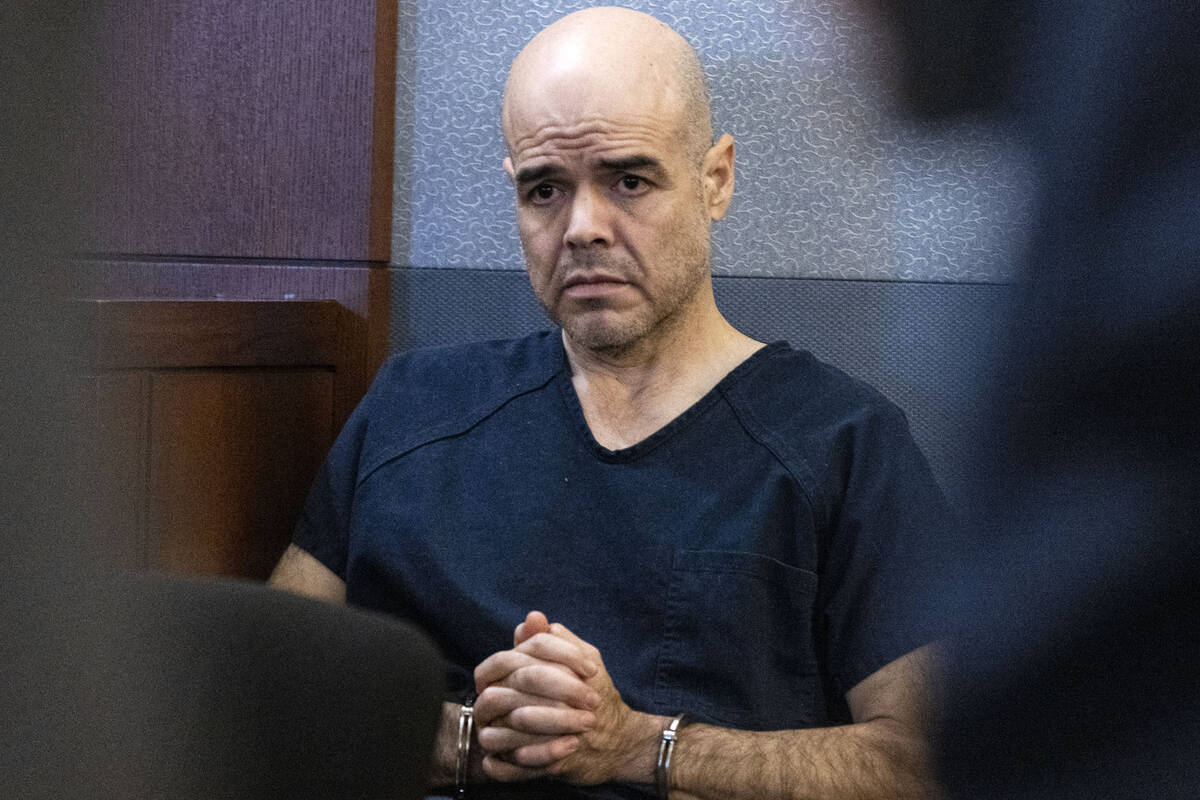Telles has thousands in assets, but taxpayers pay for two attorneys
Former Public Administrator Robert Telles owns six properties in Nevada and Arkansas with at least $200,000 in equity, records show, but taxpayers are still paying for two attorneys to defend him against a charge that he murdered Review-Journal investigative reporter Jeff German.
Telles filed documentation with the court on Sept. 20 saying he is indigent and requires a public defender despite noting that he and his wife were making $20,500 per month before his arrest and revealing he owns five rental houses. He also owns a house in Las Vegas, property records show, with a Zillow estimate of that house’s value at nearly $600,000.
The Review-Journal found the five properties in Hot Springs, Arkansas, which Telles bought for $332,000 on Dec. 30, 2019, property records show. The homes, ranging from 984 to 1904 square feet, are now valued at at least $389,000, but he did take out a $286,000 mortgage to buy them, records show. In his application to obtain a public defender, Telles did not provide details other than to say he hasn’t received any income from the rental properties, which Hot Springs city officials say are not licensed for short-term rentals.
Former Clark County prosecutor Thomas Moskal, who is now a private defense attorney, said Telles has plenty of resources to pay for his own attorney.
“There is no real hearing on indigency and prosecutors never challenge it,” he said. “There is an unspoken rule that we’ll just move on. All defendants have to say is, ‘I can’t afford counsel.’ ”
But Franny Forsman, a retired longtime federal public defender who served more than a decade on Nevada Supreme Court’s Indigent Defense Commission, said judges want to make sure a defendant has competent representation.
“It’s a dilemma to wait around and see if a defendant can come up with money if he doesn’t have cash in the bank,” she said, adding it would be unethical for prosecutors to challenge a defendant’s indigency because they could be interfering with a person’s right to counsel. “If he had a couple of hundred thousand in the bank that would be one thing, but if he has property most attorneys aren’t going to accept that as payment.”
One of Telles’ public defenders, Chief Deputy Public Defender Edward Kane, did not return a call seeking comment.
Kane and Telles’ other public defender, David Lopez-Negrete, together make about $460,000 in salary and benefits, according to Transparentnevada.com.
Telles attempted to get released on bond Tuesday but a judge denied it. On Wednesday, Telles was temporarily suspended from practicing law, according to an order signed by Supreme Court justices that alleges he may have misappropriated more than $195,000 in client funds. The bar had received three complaints about Telles since he took office as the public administrator in January 2019.
On Thursday, a grand jury indicted him on one count of murder with a deadly weapon of a person who is 60 years or older.
Telles, who was a Democratic elected official, was arrested on Sept. 7 on suspicion of murder in the fatal stabbing of German, 69, a longtime journalist in Southern Nevada. German’s body was found on Sept. 3 — he had been stabbed seven times.
Court directive
In 2008, the state Supreme Court issued an order laying out standards for when a public defender will be assigned to a defendant.
A person is deemed indigent if the defendant will experience “substantial hardship to himself or his dependants to obtain competent, qualified legal counsel,” the order said, adding that qualifying factors can include incarceration, qualifying for welfare or falling below 200 percent of the federal poverty level.
“Defendants not falling below the presumptive threshold will be subjected to a more rigorous screening process,” the order said, adding that could include determining monthly expenses and the rates local attorneys charges for similar cases.
The financial disclosure Telles submitted listed multiple reasons for him to request legal assistance, such as being unemployed or receiving Social Security benefits, but Telles only checked a box next to “currently incarcerated,” according to a copy of the form.
Moskal and Forsman concede that eligibility hearings are rare but disagree on whether that is a problem.
“There is no verification of anything,” Moskal said, adding the judge should demand Telles’ bank statements and tax returns. “No one wants to put in the work. On a case like this, it’s so obvious the judge might want to make an inquiry.”
Forsman said a defendant who has an incompetent attorney can always appeal on the basis of inadequate counsel.
“Most judges think the best thing for the case is to have the best attorney representing the defendant,” she said.
A murder case, like Telles is facing, can cost hundreds of thousands of dollars or as little as a few thousand depending on the attorney and whether there is an early plea deal, Moskal said. “Some people might do it just for the publicity as it’s a high-profile case,” he said.
Moskal said Telles could easily find someone to handle the case for $100,000, which he could raise by selling his properties.
He also said there is a statute requiring an affidavit of financial ability and didn’t believe the form Telles filled out meets the standard. The law requires a defendant to pay back the county if it is found he could afford counsel but that is never enforced, he said.
Property values
Managing property is part of Telles’ work history.
His ex-wife, Tonia Burton, said she and Telles found jobs as apartment managers when they moved to Las Vegas around 2005. Before and during law school, Telles worked in heating, ventilation, and air conditioning repair because he was calling companies as an apartment manager and he saw it as an opportunity to make more money because of Vegas’ hot summer weather, she said.
Telles likely did not report the properties on his financial disclosure because the form only requires disclosing properties a candidate owns in Nevada or adjacent states, records show.
His Las Vegas house at 9624 Spanish Steps, where he was arrested last month, is assessed by the county for at least $320,000, though it has a $232,803 mortgage on it, records show.
His wife Mary Ann (Mae) Ismael, works as a senior consultant at Talent Function, a Cielo Company, according to her LinkedIn account. She and Telles also owned a Nevada LLC, Southern Nevada Tutors. Records show it closed in 2019.
In the financial disclosure, Telles also said he has about $10,000 in savings and Ismael makes $10,500 a month. County spokesman Dan Kulin said the county paid him for the last time on Sept. 22, but will try to get the money back from the last two paychecks after a judge removed him from office on Oct. 5.
“Given the County’s position that he has been negligent of his elected duties since at least Sept. 7, the County will be issuing a demand letter seeking repayment of the paycheck payments made since then,” Kulin wrote.
Moskal urged the judge to look into Telles’ finances further, and Forsman said there is always an opportunity to remove a public defender if Telles has the resources to pay for his own attorney.
The public defenders and prosecutors are attempting to access German’s devices and possibly identify his confidential sources.
Attorneys representing the Review-Journal have argued that Metro’s seizure of German’s phone and computers violated Nevada’s shield law and the federal Privacy Protection Act.
Metro attorneys have asserted that searching the devices is necessary to investigate the crime and give Telles a fair trial.
Editor’s note: Attorney Edward Kane is not related to Arthur Kane.
Contact Arthur Kane at akane@reviewjournal.com and follow @ArthurMKane on Twitter. Investigative reporter Briana Erickson contributed to this story.





























